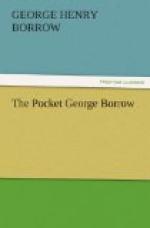‘Your health in Rommany, brother,’ said Tawno Chikno, to whom the cup came next.
‘The Rommany Rye,’ said a third.
‘The Gypsy gentlemen,’ exclaimed a fourth, drinking.
And then they all sang in chorus:—
’Here the Gypsy gemman see,
With his Roman jib and his rome
and dree—
Rome and dree, rum and dry
Rally round the Rommany Rye.’
‘And now, brother,’ said Mr. Petulengro, ’seeing that you have drunk and been drunken, you will perhaps tell us where you have been, and what about?’
‘I have been in the Big City,’ said I, ‘writing lils’ [books].
‘How much money have you got in your pocket, brother?’ said Mr. Petulengro.
‘Eighteen pence,’ said I; ‘all I have in the world.’
‘I have been in the Big City, too,’ said Mr. Petulengro; ’but I have not written lils—I have fought in the ring—I have fifty pounds in my pocket—I have much more in the world. Brother, there is considerable difference between us.’
‘I would rather be the lil-writer, after all,’ said the tall, handsome, black man; ‘indeed, I would wish for nothing better.’
‘Why so?’ said Mr. Petulengro.
‘Because they have so much to say for themselves,’ said the black man, ’even when dead and gone. When they are laid in the churchyard, it is their own fault if people a’n’t talking of them. Who will know, after I am dead, or bitchadey pawdel, that I was once the beauty of the world, or that you, Jasper, were—’
’The best man in England of my inches. That’s true, Tawno—however, here’s our brother will perhaps let the world know something about us.’
‘Not he,’ said the other, with a sigh; ’he’ll have quite enough to do in writing his own lils, and telling the world how handsome and clever he was; and who can blame him? Not I. If I could write lils, every word should be about myself and my own tacho Rommanis—my own lawful wedded wife, which is the same thing. I tell you what, brother, I once heard a wise man say in Brummagem, that “there is nothing like blowing one’s own horn,” which I conceive to be much the same thing as writing one’s own lil.’
* * * * *
At length the moon shone out faintly, when suddenly by its beams I beheld a figure moving before me at a slight distance. I quickened the pace of the burra, and was soon close at its side. It went on, neither altering its pace nor looking round for a moment. It was the figure of a man, the tallest and bulkiest that I had hitherto seen in Spain, dressed in a manner strange and singular for the country. On his head was a hat with a low crown and broad brim, very much resembling that of an English waggoner; about his body was a long loose tunic or slop, seemingly of coarse ticken, open in front, so as to allow the interior garments to be occasionally seen. These appeared to consist of a jerkin and short velveteen pantaloons.




